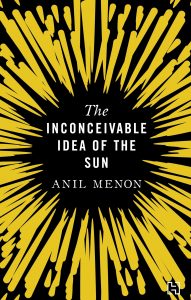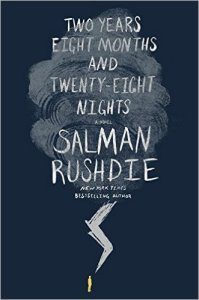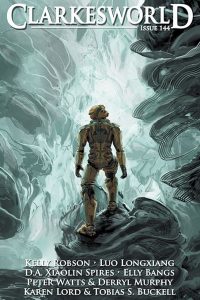Ian Mond Reviews The Inconceivable Idea of the Sun by Anil Menon
 The Inconceivable Idea of the Sun, Anil Menon, (Hachette India 978-9-39102-860-2, ₹599.00, 280pp, tp) June 2022.
The Inconceivable Idea of the Sun, Anil Menon, (Hachette India 978-9-39102-860-2, ₹599.00, 280pp, tp) June 2022.
Anil Menon had me at the contents page of his debut collection, The Inconceivable Idea of the Sun. In place of the expected list of titles, Menon offers up an introductory essay that starts by ridiculing “Western” authors of yesteryear who would begin “with excuses, explanations and snivels about their work” and then sets about doing precisely what he accuses them of – explaining the collection we’re holding – but not before he has murdered his ego in line with Foucault’s belief that the author “must assume the role of the dead man in the game of writing.” The now deceased Menon introduces us to a differently titled book, Quintessence & Other Stories (which may have been the collection’s original title or part of Menon’s postmodern deconstruction of the conventional contents page), before going on to define speculative fiction (“Spec fic isn’t anti-realist; it is anti-naturalist”) and its multiple subgenres only to accurately conclude that “true readers will resist all such classifications and divisions”. When we do, finally, reach the contents, they’ve been rendered in verse; because, of course they have. (It’s worth noting that one of the stories, “God’s Own Language”, is missing from my advance copy of the book. It says something about Menon’s introduction that I have no idea if this is intentional or a printing error). The 15 stories that follow this bewildering, brilliant, and witty contents page aren’t nearly as structurally inventive or self-aware, but that’s not a criticism. What Menon serves up is a diversity of storytelling modes and genres that display an infectious passion and delight for fiction in all its forms.
“The Man Without Quintessence”, the collection’s thoughtful opening story, details a near future administered by an Artificial Intelligence that requires each person to have a distinctive attribute – such as the unique pattern of an iris – to allow them to function within society.
As the title suggests, the piece considers those rare few who, for genetic reasons, lack quiddity and, as such, are treated as if they don’t exist. The story’s uneasiness toward an “Internet of Things” underpinned by biology and governed by AI is a theme that crops up throughout the collection. This includes “Into the Night”, where an elderly Brahmin, having moved in with his daughter after the loss of his wife, struggles to come to terms with a world entirely mediated by technology, and “Archipelago”, where the adoption of a “sensorium” – implants that allow users to share emotions and experiences – by residents of an artificial island leads to tragedy for a group of teenagers who push the system to its limits. Of these stories, the one that resonated with me the most was “The Robots of Eden”, which asks whether fiction has any relevance in a society of “Enhanced” individuals whose emotions are moderated by chips embedded in the brain. “The Robots of Eden” not only speaks to the dehumanising effect of technology, it also reminds us that this rush toward posthumanism, and this rejection of who we once were won’t absolve us of our past sins.
Identity, especially in relation to one’s family, history, and traditions, is also an essential facet of Menon’s work. Two terrific examples are “God’s Own Country” and “The Mind-Body Problem”. The latter is this subtle, ghostly tale where the narrator, having taken his girlfriend home to meet the family patriarch, becomes increasingly disturbed as she gradually assumes the mannerisms and even the name of his first love, who drowned when they were teens. The former is the heart-wrenching but delicately told piece about a young man who believes he embodies the resurrected soul of a dying woman’s son.
In a collection this accomplished, it’s hard to choose a favourite. So, I’ll pick three. First is the joyful “Love in a Hot Climate”, narrated in the florid voice of Mr Purushottam Deshpande (“gentleman, entrepreneur, proprietor, autodidact, author, scout.”), who, in a bid to convince his beloved’s father that he’s worthy of his daughter, decides to corner the market in Time Machines. That this shaggy dog tale is predicated on a misunderstanding of Milton Friedman’s economic advice to India makes it all the more marvellous. Second is the titular, “The Inconceivable Idea of the Sun”, a bookish story full of literary references and “phantom works,” which distressingly starts with a couple attempting to consolidate their libraries and then transitions into a genuinely tense, reality-bending argument over writers and books that do or do not exist. And number three is the remarkable “How Not to Tell the Ramayana”, which is both a retelling of the ancient Sanskrit epic and an erudite literary essay on the many versions and iterations of the ancient Sanskrit epic. This extraordinary blending of hermeneutics and narrative encapsulates the strengths of Menon’s fiction: a love for the fundaments of storytelling.
At this stage, hard copies of The Inconceivable Idea of the Sun are available only in India (it can, however, be purchased electronically). But similar to Samit Basu’s Chosen Spirits, which was thankfully published under the title The City Inside by Tordotcom earlier this year and two years after it was released in India, I’m hoping that UK or US publishers will pick up and broaden the audience for Anil Menon’s tremendous debut collection.
Ian Mond loves to talk about books. For eight years he co-hosted a book podcast, The Writer and the Critic, with Kirstyn McDermott. Recently he has revived his blog, The Hysterical Hamster, and is again posting mostly vulgar reviews on an eclectic range of literary and genre novels. You can also follow Ian on Twitter (@Mondyboy) or contact him at mondyboy74@gmail.com.
This review and more like it in the December 2022 issue of Locus.
 While you are here, please take a moment to support Locus with a one-time or recurring donation. We rely on reader donations to keep the magazine and site going, and would like to keep the site paywall free, but WE NEED YOUR FINANCIAL SUPPORT to continue quality coverage of the science fiction and fantasy field.
While you are here, please take a moment to support Locus with a one-time or recurring donation. We rely on reader donations to keep the magazine and site going, and would like to keep the site paywall free, but WE NEED YOUR FINANCIAL SUPPORT to continue quality coverage of the science fiction and fantasy field.
©Locus Magazine. Copyrighted material may not be republished without permission of LSFF.






